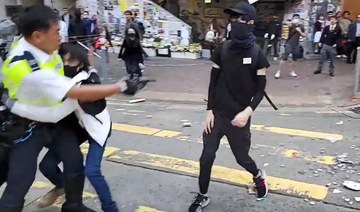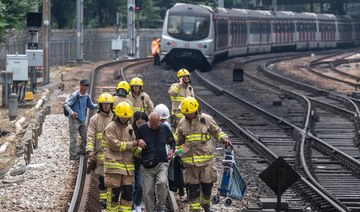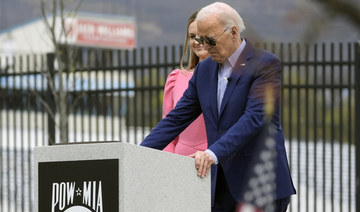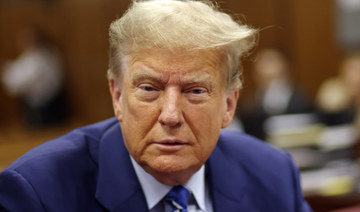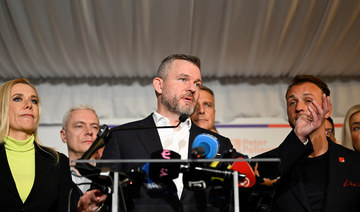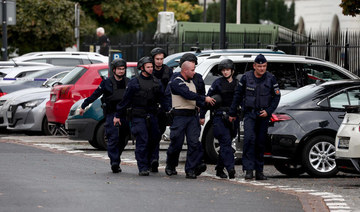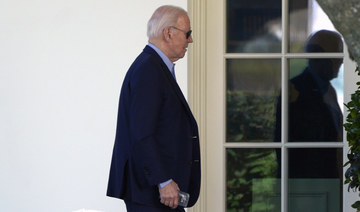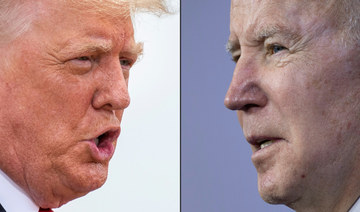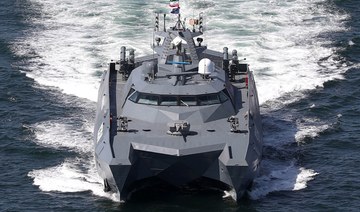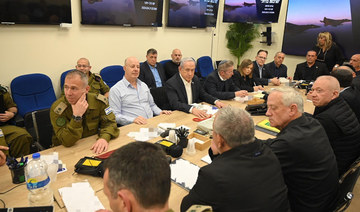HONG KONG: University students from mainland China and Taiwan are fleeing Hong Kong, while those from two Scandinavian countries have been moved or urged to leave as college campuses become the latest battleground in the city’s 5-month-long anti-government unrest.
Marine police used a boat Wednesday to help a group of mainland students leave the Chinese University of Hong Kong, which remained barricaded by demonstrators after violent clashes with police on Tuesday.
Authorities announced that primary and secondary school classes would be suspended Thursday as clashes turn increasingly violent.
The protests have taken on a strong anti-China bent, with radical demonstrators trashing branches of mainland banks, China’s official Xinhua News Agency and restaurant chains whose owners support the Beijing government.
Hong Kong is part of China but has its own legal system and greater freedoms than the mainland. The protesters say those freedoms are under threat from a city government that is beholden to Beijing. China says the protesters are rioters who want to break away from Chinese rule.
For the third day in a row, protesters widely disrupted train service, blocked streets and rallied in the central business district. They hunkered down for possible clashes with police at university campuses.
The Technical University of Denmark urged 36 students in Hong Kong to return home, saying “some of our students have been forced to move from their dormitories because they were put on fire.”
Norwegian student Elina Neverdal Hjoennevaag told her country’s broadcaster NRK that students are being sent to a hotel, adding, “I don’t really know what is happening. I must pack.”
Mainland students have said in online posts that they are being targeted by protesters who have broken into their dormitories, spray-painted insults on walls and banged on their doors, the Beijing Evening News reported.
Many are taking advantage of a program that offers a week of free accommodation in one of a dozen hotels and hostels in the neighboring mainland city of Shenzhen, Chinese media reported.
The service was established in 2013 for recent graduates looking for jobs in the tech hub.
Taiwan arranged flight tickets for 126 of its students at Chinese University to fly home Wednesday night, public broadcaster RTHK reported.
Many subway and rail stations were closed after protesters threw debris on tracks and vandalized train cars. University classes remained suspended.
Hong Kong Baptist University told students that instruction and exams would be conducted online for the two remaining weeks of the semester, with arrangements for students who have returned to the mainland to join in.
The Education Bureau suspended classes at primary and secondary schools for safety reasons. Describing the situation as outrageous, the bureau said students should stay at home “and must not participate in any unlawful activities.”
Many of the masked protesters are thought to be high school and university students. Of the more than 4,000 people arrested since the protests began, nearly 40% are students, police said.
Police subdued a few protesters as a crowd gathered for a third straight day in a central business and high-end retail district, RTHK reported. Office workers watched from the sidewalks.
Many students at Chinese University on the outskirts of the sprawling metropolis were armed with gasoline bombs while some carried bows and arrows.
“We are afraid the police will come to attack our home and our school, and we have to protect our home and our school,” said one student, who gave his name as X Chan.
The clashes at the campus Tuesday were particularly intense. Police said protesters threw more than 400 gasoline bombs, more than on any other day in the protests.
Police fired 1,567 tear gas canisters, 1,312 rubber bullets and 380 beanbag rounds throughout Hong Kong on Tuesday. A total of 142 people were arrested and 10 people were taken to hospitals with injuries.
Security Secretary John Lee said the use of force at Chinese University was needed because protesters were dropping objects onto a roadway below.
“The police have a duty to ensure that this public safety is maintained,” he told reporters. “That is why they had to ensure that they would take charge of this bridge, which previously was occupied by the mobsters.”
The university’s student union president, Jacky So, appealed for an injunction from the High Court to ban police from entering the campus without a warrant or the school’s approval.
The injunction would also block police from using crowd control weapons, such as tear gas and rubber bullets, at the university.
Religious leaders called on both police and protesters to show restraint: “At this very critical point, the people of Hong Kong must unite and say no to violence,” the heads of Hong Kong’s six major religious groups said in a statement.
The Chinese government’s liaison office in Hong Kong said the semi-autonomous territory is “slipping into the abyss of terrorism.” It called the setting of a man on fire an act of “flagrant terrorism.”
On Monday, a police officer drew his gun during a struggle with protesters, shooting one in the abdomen. In another neighborhood, a 57-year-old man who was defending China was set on fire after an apparent argument.
The man remained in critical condition Wednesday, and the protester was in serious condition, the Hospital Authority said.
Chinese foreign ministry spokesman Geng Shuang said members of the US Senate should stop trying to promote bills on human rights or democracy in Hong Kong.
“I want to reiterate that Hong Kong is China’s Hong Kong. Hong Kong affairs are purely China’s internal affairs and cannot be interfered by any external forces,” he said at a daily briefing.
The movement began in June over a now-withdrawn extradition bill. Activists saw it as another sign of an erosion in Hong Kong’s autonomy and freedoms, which China promised would be maintained for 50 years under a “one nation, two systems” principle when the former British colony returned to Chinese control in 1997.
Chinese, other students flee Hong Kong as violence worsens
Chinese, other students flee Hong Kong as violence worsens
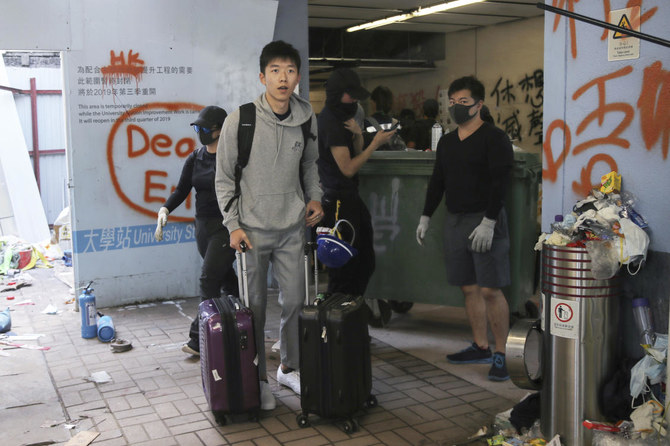
- Students have said that they are being targeted by protesters who have broken into their dormitories, spray-painted insults on walls and banged on their doors
- Many subway stations were closed, and university classes remained suspended
Poland’s president becomes the latest leader to visit Donald Trump as allies eye a possible return
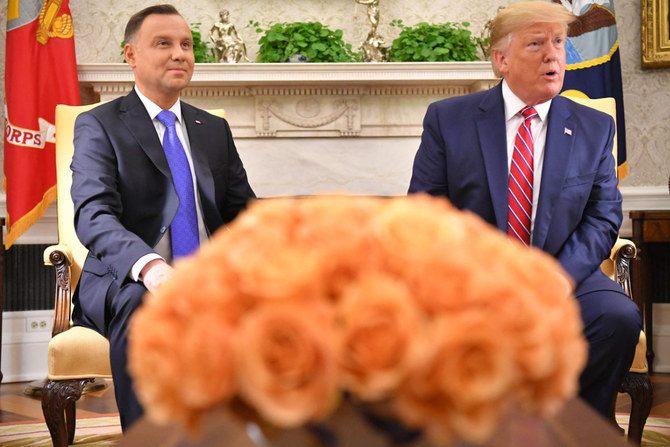
- Andrzej Duda, who has long expressed admiration for Trump, is also a staunch supporter of Ukraine in its war against Russia
- He has encouraged the US to provide more aid to Kyiv. That funding has been held up by Trump allies in Congress
NEW YORK: Former President Donald Trump met Wednesday in New York with Polish President Andrzej Duda, the latest in a series of meetings with foreign leaders as Europe braces for the possibility of a second Trump term.
The presumptive Republican nominee hosted Duda for dinner at Trump Tower, where the two were expected to discuss Ukraine, among other topics. Duda, who has long expressed admiration for Trump, is also a staunch supporter of Ukraine and has encouraged Washington to provide more aid to Kyiv amid Russian’s ongoing invasion. That funding has been held up by Trump allies in Congress.
As he arrived, Trump praised the Polish president, saying, “He’s done a fantastic job and he’s my friend.”
“We had four great years together,” Trump added. “We’re behind Poland all the way.”
US allies across the world were caught off guard by Trump’s surprise 2016 win, forcing them to scramble to build relationships with a president who often attacked longstanding treaties and alliances they valued. Setting up meetings with him during the 2024 campaign suggests they don’t want to be behind again.
Even as he goes on trial for one of the four criminal indictments against him, Trump and Democratic President Joe Biden are locked in a rematch that most observers expect will be exceedingly close in November.
“The polls are close,” said Sen. Chris Murphy, D-Connecticut, a Biden ally and a major voice in his party on foreign affairs. “If I were a foreign leader — and there’s a precedent attached to meeting with candidates who are nominated or on the path to being nominated — I’d probably do it too.”
Murphy noted that former President Barack Obama did a lengthy international tour and met with foreign leaders when he first ran for the White House. So did Mitt Romney, the former Massachusetts governor, who challenged Obama in 2012 and whose trip included a stop in Poland’s capital, Warsaw.
Duda’s visit comes a week after Trump met with British Foreign Secretary David Cameron, another NATO member and key proponent of supporting Ukraine, at the former president’s Florida estate.
And last month, Trump hosted Hungarian Prime Minister Viktor Orbán, an autocrat who has maintained the closest relationship with Russia among European Union countries. Orban shared a montage of footage of the visit on his Instagram feed, with included an image of him and his staff meeting with Trump and the former president’s aides in a scene that looked like an official bilateral meeting.
Trump also met briefly in February with Javier Milei, the fiery, right-wing populist president of Argentina who ran a campaign inspired by Trump, complete with red “Make Argentina Great Again” hats. Milei gave Trump an excited hug backstage at the annual Conservative Political Action Conference outside Washington, according to video posted by a Trump campaign aide.
Biden administration officials have been careful not to weigh in publicly on foreign leaders’ meetings with Trump, who they acknowledge has a real chance of winning the race.
While some officials have privately expressed frustration with such meetings, they are mindful that any criticism would open the US to charges of hypocrisy because senior American officials, including Secretary of State Antony Blinken, meet frequently with foreign opposition figures at various forums in the United States and abroad.
Security and policy officials monitor the travel plans of foreign officials visiting the US, but generally don’t have a say in where they go or with whom they meet, according to an administration official who spoke on the condition of anonymity to discuss protocol.
Trump has been back in his hometown this week for the start of his criminal hush money trial, which has dramatically limited his ability to travel and campaign. While in town, aides have been planning a series of events that began Tuesday night when Trump, after court adjourned, stopped by a Harlem bodega where a man was killed to rail against crime and blast the district attorney who made him the first former president in US history to stand criminal trial.
Duda, a right-wing populist who once proposed naming a military base in his country “Fort Trump,” described the dinner earlier Wednesday as a private get-together between friends at Trump’s former residence while he is in town for meetings at the United Nations.
“I have been invited by Mr. Donald Trump to his private apartment,” Duda told reporters, saying it was “a normal practice when one country has good relations with another country” to want those relations to be as strong as “possible with the representatives of various sides of the political stage.”
He described a friendly relationship with Trump built over years of working together.
“We know each other as people. Like two, I can say in some way, friends,” said Duda, whose term ends in 2025.
Duda’s visit comes as House Republicans wrangle over a $95 billion foreign aid bill that would provide new funding to Ukraine, including money for the US military to replace depleting weapon supplies.
Many Trump allies in the House are fiercely opposed to aiding Ukraine, even as the country warns that it is struggling amid a fresh Russian offensive. Trump has said he might be open to aid in the form of a loan.
Like Cameron, Duda’s efforts to push the US to approve additional aid put him in common cause with Biden, who has struggled for six months to unlock additional congressional funding.
One area where Trump and Duda agree when it comes to the conflict are their efforts to push NATO members to increase their defense spending. Duda has called on fellow members of the alliance to raise their spending to 3 percent of gross domestic product as Russia continues its invasion of Ukraine. That would represent a significant increase from the current commitment of 2 percent by 2024.
Trump, in a stunning break from past US precedent, has long been critical of the Western alliance and has threatened not to defend member nations that do not hit that spending goal. That threat strikes at the heart of the alliance’s Article 5, which states that any attack against one NATO member will be considered an attack against all.
In February, Trump went even further, recounting that he’d once told leaders that he would “encourage” Russia to “do whatever the hell they want” to members that are — in his words — “delinquent.”
Duda suggested he intended to raise his proposal at the dinner.
“I have never talked with President Donald Trump about my proposal of raising the spending on defense of NATO countries from 2 percent to 3 percent of GDP, but I think that his approach to it will be positive,” he said.
The visit was met with mixed reaction in Poland, where fears of Russia run high and Duda’s friendly relationship with Trump has been a source of controversy.
Poland’s centrist Prime Minister Donald Tusk, a political opponent of Duda, was critical of the dinner but expressed hope that Duda would use it as an opportunity “to raise the issue of clearly siding with the Western world, democracy and Europe in this Ukrainian-Russian conflict.”
Duda, for his part, said he wasn’t worried since presidents regularly meet with various politicians during foreign trips.
“No, I am not worried because presidents meet with their colleagues, especially with those who had held presidential offices in their respective countries,” he said. “This is regular practice, there is nothing extraordinary here.”
Thousands protest in Georgia as parliament votes on so-called ‘Russian law’ targeting media
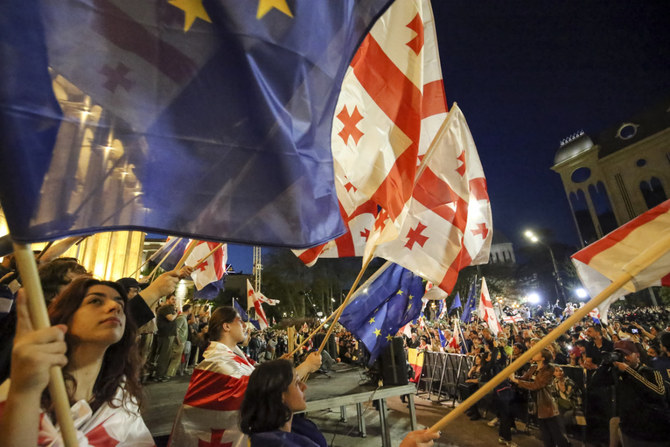
- Protesters denounce it as “the Russian law” because Moscow uses similar legislation to stigmatize independent news media
- Opponents say the proposal would obstruct Georgia’s long-sought prospects of joining the European Union
TBILISI, Georgia: Georgia’s parliament has voted in the first reading to approve a proposed law that would require media and non-commercial organizations to register as being under foreign influence if they receive more than 20 percent of their funding from abroad.
Thousands gathered outside parliament to protest. Opponents say the proposal would obstruct Georgia’s long-sought prospects of joining the European Union. They denounce it as “the Russian law” because Moscow uses similar legislation to stigmatize independent news media and organizations seen as being at odds with the Kremlin.
“If it is adopted, it will bring Georgia in line with Russia, Kazakhstan and Belarus and those countries where human rights are trampled. It will destroy Georgia’s European path,” said Giorgi Rukhadze, founder of the Georgian Strategic Analysis Center.
In an online statement Wednesday, EU foreign policy chief Josep Borrell described the parliament’s move as “a very concerning development” and warned that “the final adoption of this legislation would negatively impact Georgia’s progress on its EU path.”
“This law is not in line with EU core norms and values,” Borrell said.
Borrell said that “Georgia has a vibrant civil society” that is a key part of its EU membership quest.
“The proposed legislation would limit the capacity of civil society and media organizations to operate freely, could limit freedom of expression and unfairly stigmatize organizations that deliver benefits to the citizens of Georgia,” he added.
Although Georgian President Salome Zourabichvili would veto the law if it is passed by parliament in the third reading, the ruling party can override the veto by collecting 76 votes. Then the parliament speaker can sign it into law.
The bill is nearly identical to a proposal that the governing party was pressured to withdraw last year after large street protests. Police in the capital, Tbilisi, used tear gas Tuesday to break up a large demonstration outside the parliament.
Wednesday had an even larger rally. Speaking there, opposition parliament member Aleksandre Ellisashvili denounced lawmakers who voted for the bill as “traitors” and said the rest of Georgia will show them that “people are power, and not the traitor government.”
The only change in wording from the previous draft law says non-commercial organizations and news media that receive 20 percent or more of their funding from overseas would have to register as “pursuing the interests of a foreign power.” The previous draft law said “agents of foreign influence.”
Zaza Bibilashvili with the civil society group Chavchavadze Center called the vote on the law an “existential choice.”
He suggested it would create an Iron Curtain between Georgia and the EU, calling it a way to keep Georgia “in the Russian sphere of influence and away from Europe.”
freedom of expression and unfairly stigmatize organizations that deliver benefits to the citizens of Georgia,” he added.
Biden is off on details of his uncle’s WWII death as he calls Trump unfit to lead the military
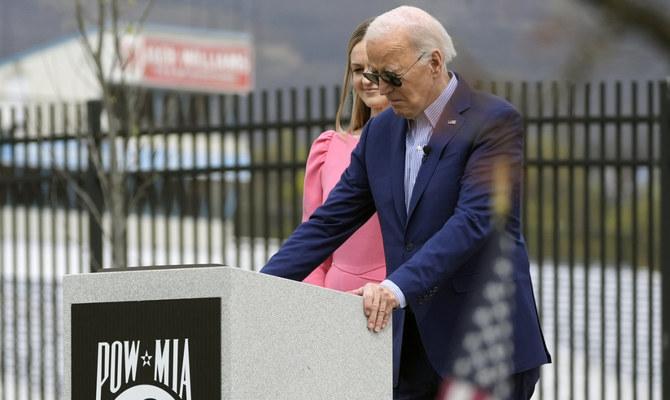
- The US government’s record of missing service members does not attribute Finnegan’s death to hostile action or indicate cannibals were any factor
WASHINGTON: President Joe Biden on Wednesday misstated key details about his uncle’s death in World War II as he honored the man’s wartime service and said Donald Trump was unworthy of serving as commander in chief.
While in Pittsburgh, Biden spoke about his uncle, 2nd Lt. Ambrose J. Finnegan Jr., aiming to draw a contrast with reports that Trump, while president, had called fallen service members “suckers” and “losers.”
Finnegan, the brother of Biden’s mother, “got shot down in New Guinea,” Biden said. The president said Finnegan’s body was never recovered and “there used to be a lot of cannibals” in the area. Biden, who also relayed a version of the story earlier in the day after stopping by the memorial in Scranton, was off on the particulars.
The US government’s record of missing service members does not attribute Finnegan’s death to hostile action or indicate cannibals were any factor.
“We have a tradition in my family my grandfather started,” said Biden, a toddler at the time of his uncle’s death in 1944. “When you visit a gravesite of a family member — it’s going to sound strange to you — but you say three Hail Marys. And that’s what I was doing at the site.”
Referring to Trump, the presumptive GOP presidential nominee, Biden said, “That man doesn’t deserve to have been the commander in chief for my son, my uncle.”
Biden’s elder son, Beau, died in 2015 of brain cancer, which the president has stated he believes was linked to his son’s yearlong deployment in Iraq, where the military used burn pits to dispose of waste.
Some former Trump officials have claimed the then-president disparaged fallen service members as “suckers” and “losers” when, they said, he did not want to travel in 2018 to a cemetery for American war dead in France. Trump denied the allegation, saying, “What animal would say such a thing?”
According to the Pentagon’s Defense POW/MIA Accounting Agency, Biden’s uncle, known by the family as “Bosie,” died on May 14, 1944, while a passenger on an Army Air Forces plane that, “for unknown reasons,” was forced to ditch in the Pacific Ocean off the northern coast of New Guinea. “Both engines failed at low altitude, and the aircraft’s nose hit the water hard,” the agency states in its listing of Finnegan. “Three men failed to emerge from the sinking wreck and were lost in the crash.”
The agency said Finnegan was a passenger on the plane when it was lost. “He has not been associated with any remains recovered from the area after the war and is still unaccounted-for,” according to the agency.
White House spokesman Andrew Bates did not address the discrepancy between the agency’s records and Biden’s account when he issued a statement on the matter.
“President Biden is proud of his uncle’s service in uniform,” Bates said, adding Finnegan ”lost his life when the military aircraft he was on crashed in the Pacific after taking off near New Guinea.”
Biden “highlighted his uncle’s story as he made the case for honoring our ‘sacred commitment ... to equip those we send to war and take care of them and their families when they come home,’ and as he reiterated that the last thing American veterans are is ‘suckers’ or ‘losers.’”
The Democratic president also misstated when uncles enlisted in the military, saying they joined “when D-Day occurred, the next day,” in June 1944, when they actually joined weeks after the Dec. 7, 1941, attack on Pearl Harbor.
After Finnegan’s death, a local newspaper published a telegram from Gen. Douglas MacArthur expressing condolences to Finnegan’s family:
“Dear Mr. Finnegan: In the death of your son, Second Lt. Ambrose J. Finnegan Jr., while in service of his country, you have my profound sympathy. Your consolation may be that he died in the uniform of our beloved country, serving in a crusade from which a better world for all will come. Very faithfully, Douglas MacArthur.”
Biden, in his 2008 book “Promises to Keep,” made only brief mention of his uncle, describing him as flyer who was killed in New Guinea.
Russian missile barrage on Ukraine city kills 17
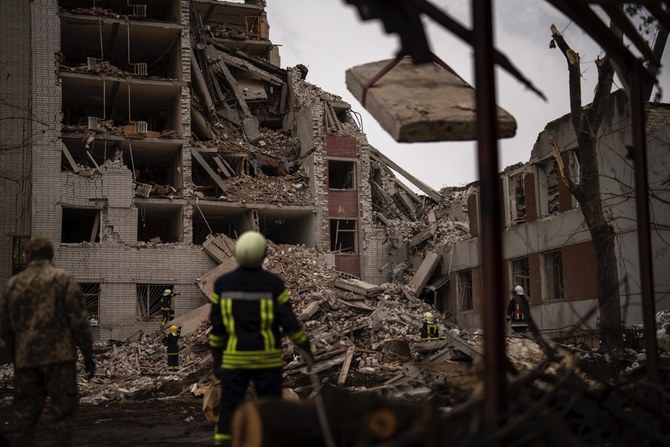
- The official death toll grew to 17 during the day, while emergency services said 60 people — including three children — had been wounded
CHERNIGIV, Ukraine: Three Russian missiles crashed into Ukraine’s historic city of Chernigiv on Wednesday, killing 17 people as officials pleaded for more air defense systems from allies.
Pools of blood gathered on the street at the scene of one strike, where rescuers searched for survivors in the rubble and carried away the wounded on stretchers, official images showed.
As President Volodymyr Zelensky appealed for more help from Western allies, the US House of Representatives finally announced a vote on a massive new military aid package that includes some $61 billion in long-delayed support for Kyiv, a move welcomed by President John Biden.
In Chernigiv, resident Olga Samoilenko told AFP how she ducked with her children into the corridor of their apartment building for protection when the first missile exploded.
“Our neighbors were already there. We started shouting for everyone to fall to the floor. They did. There were two more explosions. Then we ran to the parking lot,” the 33-year-old said.
The official death toll grew to 17 during the day, while emergency services said 60 people — including three children — had been wounded.
Mayor Oleksandr Lomako said more than a dozen buildings had been damaged in the attack while other officials said dozens of vehicles and medical and educational facilities were also damaged.
A 25-year-old policewoman on sick leave was among those killed after suffering a severe shrapnel injury, the interior minister announced.
AFP journalists at the scene saw a body being pulled from the rubble and an eight-story hotel building gutted by the strike where municipal workers were using a crane to clear debris.
Nearby apartments, a beauty salon and beer shop were among structures whose windows were blown out by the attack.
The Chernigiv region, which borders Belarus to the north, was partially occupied at the beginning of the Russian invasion but has been spared fighting for around two years since Russian forces retreated.
Zelensky blamed Russia for the attack but also said the West should do more to help defend Ukraine’s skies.
“This would not have happened if Ukraine had received sufficient air defense equipment and if the world’s determination to resist Russian terror had been sufficient,” he said.
Addressing the European Council by video link later Wednesday, Zelensky said Ukraine should enjoy the same cover from aerial attacks as Israel and pleaded for more air defense systems.
“Here in Ukraine, in our part of Europe, unfortunately, we don’t have the level of defense that we saw recently in the Middle East,” Zelensky said, according to a statement on his web site.
Zelensky was referring to the interception of Iran’s drone and missile barrage on Israel last Saturday.
“Our Ukrainian sky, the sky of our neighbors deserves the same level of defense.”
The Ukrainian president added: “All lives are equally valuable.”
In Washington, Biden applauded the planned vote in Congress on the massive new Ukraine aid package, scheduled for Saturday after months of political wrangling, and called on American lawmakers to pass it.
“I will sign this into law immediately to send a message to the world: ‘We stand with our friends, and we won’t let Iran or Russia succeed’,” he said in a White House statement.
Chernigiv lies some 145 kilometers (90 miles) north of Ukraine’s capital, Kyiv, and had a pre-war population of around 285,000 people.
The city was badly damaged when Russian tanks swept into Ukraine from Belarusian territory in February 2022 and besieged the city until April that year.
EU leaders back new Iran sanctions after attack on Israel
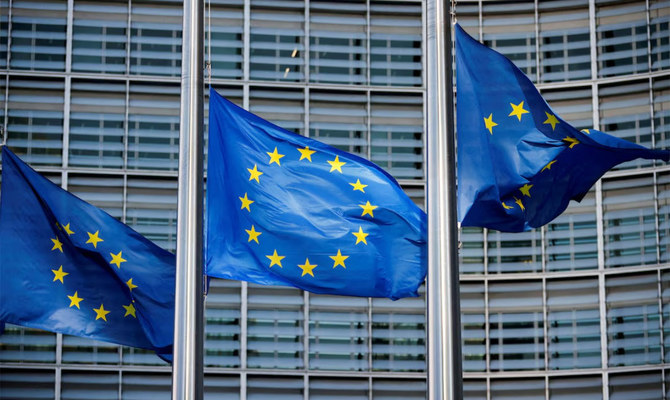
- EU leaders condemned the Iranian attack, reaffirmed their commitment to Israel’s security
BRUSSELS: European Union leaders decided on Wednesday to step up sanctions against Iran after Tehran’s missile and drone attack on Israel left world powers scrambling to prevent a wider conflict in the Middle East.
The summit in Brussels is the first meeting of the EU’s 27 national leaders since Saturday’s attack, more than six months into the war between Israel and the Iran-backed Palestinian militant group Hamas.
Israel has signalled that it will retaliate but has not said how. EU leaders condemned the Iranian attack, reaffirmed their commitment to Israel’s security and called on all sides to prevent more tensions, including in Lebanon.
“The European Union will take further restrictive measures against Iran, notably in relation to unmanned aerial vehicles (UAVs) and missiles,” the leaders said in a joint statement.



